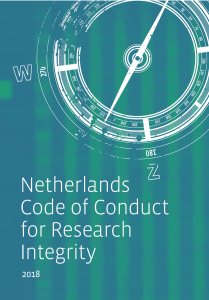The Netherlands Code of Conduct for Research Integrity was published on 14 September 2018 and The Code of Conduct entered into force on 1 October 2018.
Why is this code of conduct important:
It gives an overview of rights and duties for individual researchers as well as research groups or organizations dealing with research.
This Code has been adopted by many Dutch organizations like e.g. he Royal Netherlands Academy of Arts and Sciences (KNAW) and others.
The code also respects the scope of international framework documents such as the Singapore Statement on Research Integrity (2010),the OECD’s Best Practices for Ensuring Scientific Integrity and Preventing Misconduct (2007) and ALLEA’s recently revised European Code of Conduct for Research Integrity (2017)
Contents of the Code of Conduct for Research Integrity
It covers and describes five ethical principles:
Honesty
Scrupulousness
Transparency
Independence
Responsibility
Many people wonder if research ethics and research integrity are the same things. Well it is clear that it is closely related. In most cases they say that research ethics is a subset of research integrity. We could say Research Integrity covers the full research process and research ethics focuses more on the principle of avoiding harm to research subjects.
Implementation:
All universities in the Netherlands are now developing their own policy on Research ethics derived from this Netherlands code.
Of course not all universities do this in the same way and I will explain below what happens in my University: the University of Twente (UT)
At UT we look at integrity from an integrated perspective and we see three different areas:
- academic/scientific integrity; includes research data management, research ethics and the overall research culture etc.
- social integrity; includes aggression protocol, code of conduct regarding relations at work etc.
- business integrity; includes security and ICT use, privacy of data of employees/students etc.
For each part the university is developing an action plan.
Some examples are:
- implementation of ethical committees across UT and revision of integrity complaints procedure
- assessment of external communication and awareness regarding integrity.
- execution, development of data management plans and archiving of research data
- training for postdocs and staff and integrity education in BSc/MSc curricula will be developed
- researchers are asked to declare and sign the new code of conduct
I hope that with this blog we will start a series of blogs on Research Integrity in different countries.
So if you have suggestions to elaborate on this topic and what happens in your country on this front, please forward your blog posts to the ARL Section blog moderator at jerome.fronty@bnf.fr
Marga Koelen
Research Support Coordinator
University of Twente, Faculty ITC
Netherlands
